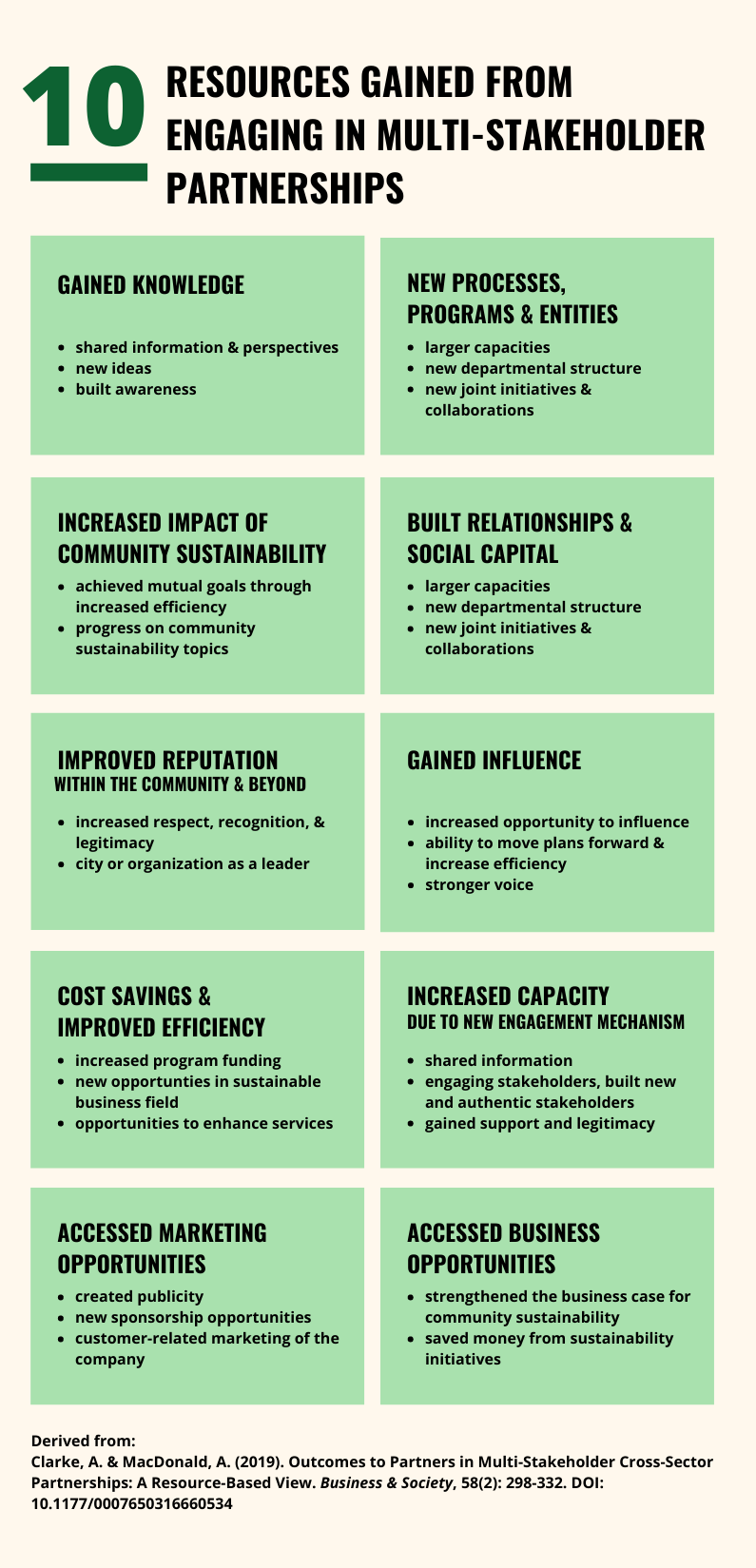In multi-stakeholder partnerships, partner engagement is challenging to establish and sustain due to the lack of partner strategic interests negotiation, which leads to the subordination of partner strategic interests to the larger goals of the partnership. Therefore, having a clear understanding of what resources and benefits partners gain through engaging in a multi-stakeholder partnership is significant.
Using resource-based view (RBV) theory, the outcomes and benefits of partner engagement are analyzed qualitatively. Ten detailed resources that partners can gain from engaging in a multi-stakeholder partnership are identified. The ten resources are listed below based on the number of comments (from having the most comments to the least comments).
- Gained knowledge. The partnership provided members the opportunity to acquire and share knowledge and ideas, change perspectives, build awareness, help community actors understand each other better, and even collaborate with other members.
- Added new internal and external processes, programs and/or entities. Partners refocused existing internal resources on building new programs, processes, and/or external entities, which enabling increased organizational capital in sustainability.
- Built relationships & social capital. Partners become part of the common efforts and gained social capital through helping to achieve the community sustainability goals. Partners are more networked with new and stronger local relationships.
- Increased impact on community sustainability. Partners furthered organizational sustainability goals, and generally succeeded in improving sustainability in their region on a range of topics such as climate change, transportation, energy, and so on. Partners were able to leverage more action by their own organization and contribute to a critical mass of actions community-wide by engaging in the partnerships.
- Improved reputation. Increased respect, recognition, legitimacy, and image were generated from the engagement of the partnership. Some organizations found their reputation improved in their corresponding city, and others found their organization’s reputation improved beyond the community.
- Gained influence. By getting involved in the community sustainability plan formulation and implementation, organizations have increased their influence. Being awarded, people involved in the partnership were more enthusiastic for moving things forward.
- Increased capacity due to new engagement mechanism. The partnership provided a new means by which to engage with community stakeholders, a process that is led by the partnership and not by the partner organization.
- Accessed business opportunities. Partners increased program funding, and were provided a growth of business opportunities. Organizations were also able to access new funding opportunities as a result of engaging in the partnership.
- Accessed marketing opportunities. Partners increased visibility, created sponsorship opportunities, and gained publicity. Most of this was about marketing for businesses and their products, whereas it was also relevant for civil society organizations and public entities to market their programs.
- Cost savings/improved efficiency. Some organizations achieved cost saving and resources efficiency improvement from applying internal sustainability into their operations as part of their commitment to the partnership. Organizations applied internal environmental initiatives which allow the organization to achieve its own internal sustainability goals.
By participating in multi-stakeholder partnerships, partners increase their capacity due to new stakeholder engagement mechanisms, the creation of new internal processes to implement the sustainability plan and organize partnership activities, and the development of new external processes, programs, and/or entities.
The below graphic summarizes these resources.

This content has been derived from:
Clarke, A.& MacDonald, A. (2019). Outcomes to Partners in Multi-Stakeholder Cross-Sector Partnerships: A Resource-Based View. Business & Society, 58(2): 298-332. DOI: 10.1177/0007650316660534
- View pre-publication version: Outcomes to Partners in Multi-Stakeholder Cross-Sector Partnerships: A Resource-Based View
See the below video for a summary of the study we conducted to obtain this information.